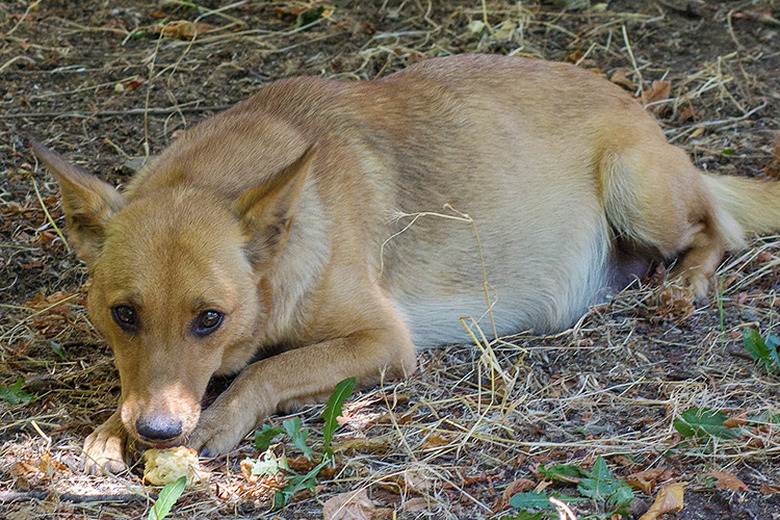Behavioral Changes In Pregnant Dogs
If your precious female pooch is expecting an upcoming litter of fluff balls, you won't ever hear her talk about morning sickness or her weird food cravings of pistachio ice cream and pickles. You might, however, notice some key behavioral changes, particularly toward the end as her due date gets closer and closer.
Canine Pregnancy Basics
Doggie gestational periods are significantly shorter than those of humans, as they usually last for around 63 days. Some pregnancies can be slightly shorter or slightly longer than that, however. It isn't uncommon for smaller dogs to have briefer pregnancies than their bigger counterparts. Pregnant dogs require the utmost care and attention from their owners, especially as parturition approaches. In the final couple weeks of pregnancy, canine mamas-to-be need bigger meal portions than usual.
Antsy Doggie
Pregnant dogs often seem to have focus issues. If your usually serene canine all of a sudden is behaving in an unusually antsy manner, then she's probably displaying a classic sign of gestation. It might seem like she's unable to sit still for even a minute. You might even notice her constantly moving away from the action, in attempts to gain a little isolation and peace away from others.
Nesting Behavior
Right at the end of pregnancy, you might also observe your dog trying to "nest," or set up a relaxed and secure spot to birth and care for her youngsters. If you notice her ripping up soft things such as blankets, sheets and towels, she might just be in nesting mode. At this time, she might even display zero desire in eating. Nesting behavior is especially common within the span of a single day pre-parturition.
Agitation
Even if your dog is usually as sweet as cherry pie, she might behave in an uncharacteristic agitated manner around the end of her gestation. Play it safe and never allow young kids or fellow pets to be anywhere near dogs who are displaying annoyed or impatient behavior.
Appetite Change
Pregnant dogs often take on massive appetites. If your dog used to be a dainty eater and now all of a sudden is polishing off her meals with seemingly boundless energy, remember that she's not only feeding herself.
Non-Behavioral Signs
Behavior isn't the sole change that comes with pregnancy in dogs. Other common changes of canine pregnancy are swelling of the mammary glands, weight gain, stomach protrusion, pinkish genital discharge and nausea. If you ever notice any signs of anything abnormal in your pregnant pooch, behavioral or otherwise, inform a veterinarian of the situation immediately.
By Naomi Millburn
References
Claws & Paws Veterinary Hospital: Gestation in Dogs
Village Veterinary Hospital: Dog Pregnancy
Pound Ridge Veterinary Center: Canine Care During Pregnancy and Whelping
East Central Veterinary Hospital: Canine Pregnancy
Wellington Veterinary Hospital: Normal Labor and Delivery in the Dog
Center Sinai Animal Hospital: Dr. Baum's Guide to Your Dog's Pregnancy
Quarry Hill Park Animal Hospital: Pregnant Dog Care
Bonnie Brae Veterinary Hospital: Pregnancy & Birth
Whitney Veterinary Hospital: Dog Breeding
Adams Animal Hospital: Feline & Canine Pregnancy
About the Author
Naomi Millburn has been a freelance writer since 2011. Her areas of writing expertise include arts and crafts, literature, linguistics, traveling, fashion and European and East Asian cultures. She holds a Bachelor of Arts in American literature from Aoyama Gakuin University in Tokyo.
